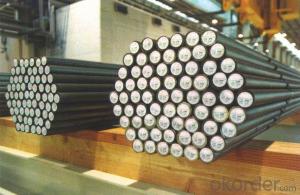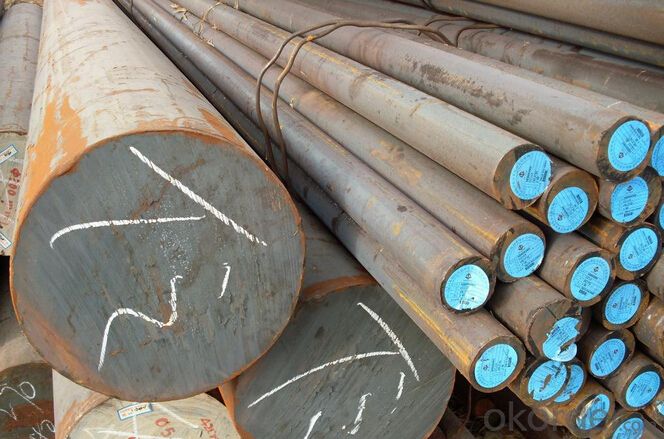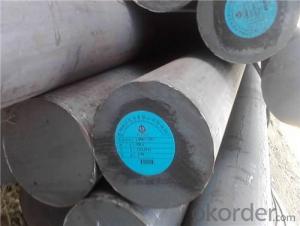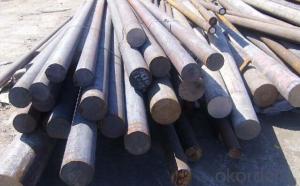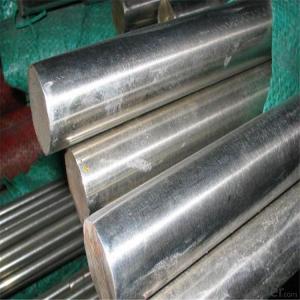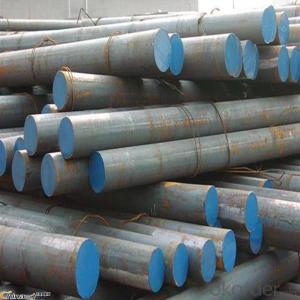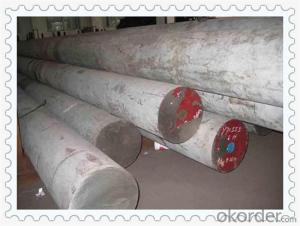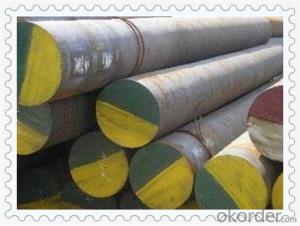Steel Bar 41cr4 40cr ASTM 5140 Round Bar
- Loading Port:
- China main port
- Payment Terms:
- TT OR LC
- Min Order Qty:
- 30 m.t.
- Supply Capability:
- 10000 m.t./month
OKorder Service Pledge
OKorder Financial Service
You Might Also Like
Specification
Steel Bar 41cr4 40cr ASTM 5140 Round Bar
Product Information:
1. Stock advantage
2. Completed size and material
3. Quick producing abilities
4. Flexible payment term
| Standard | GB/T699,GB/T700,GB/T702,GB/T3077 |
| Grade | alloy bar: 20Cr,40Cr,20CrMo, 35CrMo,42CrMo, |
| carbon bar:Q235B,20#,35#,45# | |
| Dimensions | Dia 10mm-1000mm |
| Place of Origin | China (Mainland) |
| Secondary Or Not | Non-secondary |
| Application | Structure bar, |
| Technique | Forged |
| Certification | API |
| Alloy Or Not | Is Alloy |
| packing | Hexagon bundle or bare bundle |
| Delivery | By container/train/lorry |
| Delivery time | 10days |
| Third Party Inspection | SGS/BV/LORDS |
Product Overviews:
| Product Name | Typical Grades | Diameter(mm) | Standard adopted |
| Carbon Steel | 20 (1020/S20C/C22) | Ø16-Ø300 | GB/SAE/JIS/DIN |
| 40 (1040/S40C/C40) | |||
| 45 (1045/S45C/C45) | |||
| Bearing Steel | GCr9 (51100/SUJ1) | Ø12-Ø250 | |
| GCr15 (52100/SUJ2/100Gr6) | |||
| GCr9SiMn (A485-Gr.1/SUJ3) | |||
| Cr-Mo Steel | 20Cr (5120/SCr420H/20Cr4) | Ø12-Ø250 | |
| 40Cr (5140/SCr440/41Cr4) | |||
| 42CrMo(4140/SCM440/42CrMo4) | |||
| Gear Steel | 20CrNiMo | Ø16-Ø600 | |
| 20CrMn(5115/SMnC420/20MnCr5) | |||
| 20CrNiMo(8620/SNCM220/20CrMiMo2) |
Product Show:

Our Advantages:
· Industry experience over 20 years.
· Shipment of goods -More than 70 countries worldwide.
· The most convenient transport and prompt delivery.
· Competitive price with best service.
· High technical production line with top quality products.
· High reputation based on best quality products.
With our experienced, enthusiastic and dynamic staffs, we assure to bring you the products with best quality, reasonable prices and good after-sales services under the motto: Friends First, Business After.
Communication, Experience, Expertise and Best efforts are our Promises to you.
- Q: What are the different quality control measures for special steel production?
- There are several quality control measures for special steel production, including thorough material inspections, precise chemical composition analysis, stringent dimensional and shape control, non-destructive testing methods such as ultrasonic and magnetic particle inspections, and rigorous mechanical property evaluations. Additionally, heat treatment processes and surface treatments are closely monitored to ensure the desired properties and surface finish of the special steel. Continuous monitoring and quality checks are essential throughout the production process to maintain the highest standards and meet customer requirements.
- Q: What are the main applications of special steel in the mining exploration?
- Special steel has various crucial applications in mining exploration. One main application is in the construction of drilling equipment, such as drill bits and drill rods, which require high strength and durability to withstand the challenging conditions of drilling in hard rock formations. Another important use of special steel in mining exploration is in the manufacturing of conveyor belts and other material handling systems, which need to be resistant to abrasion and corrosion. Additionally, special steel is employed for the fabrication of mining machinery components like gears, shafts, and valves, ensuring reliable performance and longevity under extreme operating conditions.
- Q: How is special steel used in the production of aircraft landing gear?
- Due to its outstanding mechanical properties and durability, special steel is extensively utilized in the manufacturing of aircraft landing gear. The landing gear, a critical component responsible for supporting the weight of an aircraft during takeoff, landing, and ground operations, must endure tremendous forces, impact loads, and harsh environmental conditions. Special steel, including high-strength low-alloy (HSLA) steel or alloy steel, is carefully chosen for its remarkable strength-to-weight ratio, high resistance to fatigue, and excellent ability to resist corrosion. These characteristics are essential in ensuring that the landing gear can withstand the extreme forces and stresses encountered during aircraft operations. The utilization of special steel in the production of landing gear offers multiple advantages. Firstly, it enables the landing gear to be lighter in weight, contributing to an overall reduction in the aircraft's weight. This results in improved fuel efficiency and increased capacity for carrying cargo, which are crucial factors in enhancing the performance of modern aircraft and reducing operating costs. Secondly, the high fatigue resistance of special steel ensures that the landing gear can endure repeated loading cycles without experiencing significant degradation in performance. This is of utmost importance since the landing gear is subjected to substantial stress during each landing and takeoff. It must be capable of withstanding these forces over a long operational lifespan. Furthermore, the excellent corrosion resistance properties of special steel guarantee that the landing gear remains protected from environmental elements such as moisture, salt, and other corrosive substances. Corrosion can weaken the structure of the landing gear, compromising its integrity and safety. Therefore, the use of special steel helps to ensure the longevity and reliability of the landing gear, reducing the need for maintenance and associated costs. To summarize, special steel plays a vital role in the manufacturing of aircraft landing gear due to its exceptional strength, fatigue resistance, and corrosion resistance. Its incorporation allows for the production of lighter and more durable landing gear, resulting in improved aircraft performance, enhanced efficiency, and increased safety.
- Q: What are the main characteristics of corrosion-resistant steel?
- Stainless steel, also referred to as corrosion-resistant steel, possesses distinct qualities that render it highly resistant to corrosion. Below are the primary attributes of this type of steel: 1. Exceptional resistance to corrosion: An essential feature of corrosion-resistant steel is its capacity to withstand corrosion. This is achieved through the addition of specific alloying elements, namely chromium, nickel, and molybdenum, which generate a protective layer on the steel's surface. This layer, known as the passive layer, prevents the steel from coming into contact with corrosive substances, including moisture, chemicals, and acids. 2. Superb durability: Corrosion-resistant steel boasts remarkable durability, making it suitable for diverse applications in harsh environments. It can endure extreme temperatures, high humidity levels, and corrosive chemicals without deteriorating or compromising its structural integrity. This durability ensures that structures constructed from corrosion-resistant steel enjoy an extended service life, thereby reducing the need for frequent maintenance and replacements. 3. Aesthetically pleasing: In addition to its functionality, corrosion-resistant steel offers aesthetic appeal. Its smooth and polished surface bestows it with a visually pleasing appearance, rendering it a popular choice for architectural applications, interior design, and decorative elements. The ability to maintain its appearance over time, without rusting or discoloration, enhances its desirability in both industrial and residential settings. 4. High strength: Renowned for its strength and toughness, corrosion-resistant steel retains its mechanical properties even in corrosive environments. Consequently, it can withstand heavy loads, impacts, and other external forces, making it suitable for applications where structural integrity and safety are paramount. Examples include bridges, buildings, marine equipment, and automotive components. 5. Versatility: Corrosion-resistant steel exhibits versatility in terms of its applications. It can be easily fabricated, welded, machined, and formed into various shapes and sizes, thereby allowing for customization and adaptability. This versatility renders it ideal for a wide array of industries, encompassing construction, aerospace, automotive, chemical processing, and marine. 6. Hygienic properties: Another crucial characteristic of corrosion-resistant steel lies in its hygienic properties. Its non-porous surface impedes the growth of bacteria, making it suitable for applications in the food and beverage industry, healthcare facilities, and pharmaceutical manufacturing. Furthermore, its ease of cleaning and maintenance further bolsters its hygiene standards. In summary, corrosion-resistant steel seamlessly combines exceptional resistance to corrosion with durability, strength, versatility, and aesthetic appeal. These characteristics render it a dependable and cost-effective material for various industries, ensuring long-term performance and protection against the detrimental effects of corrosion.
- Q: What are the different methods of improving the fatigue resistance of special steel?
- There are several methods that can be employed to improve the fatigue resistance of special steel. These methods aim to enhance the material's ability to withstand cyclic loading and prevent fatigue failure. 1. Heat Treatment: One common method is to subject the special steel to heat treatment processes such as annealing, normalizing, or quenching and tempering. These treatments can alter the microstructure of the steel, improving its strength, toughness, and fatigue resistance. 2. Surface Treatment: Applying surface treatments like shot peening or surface hardening can significantly enhance the fatigue resistance of special steel. Shot peening involves bombarding the surface with small, high-velocity steel shots, inducing compressive stresses that counteract the tensile stresses during cyclic loading. Surface hardening techniques, such as carburizing or nitriding, create a hardened layer on the surface of the steel, which increases its resistance to fatigue. 3. Alloying: Modifying the composition of the special steel by adding specific alloying elements can greatly enhance its fatigue resistance. For example, adding elements like chromium, molybdenum, or nickel can improve the material's strength, ductility, and resistance to fatigue crack initiation and propagation. 4. Grain Refinement: Refining the grain structure of the special steel can lead to improved fatigue resistance. Techniques like severe plastic deformation or grain refinement through thermomechanical processing can promote the formation of finer grains, which reduce the susceptibility to fatigue crack initiation and propagation. 5. Microstructural Control: Optimizing the microstructure of the special steel can be achieved through techniques such as controlled rolling, controlled cooling, or precipitation hardening. These methods aim to achieve a desirable microstructural balance, such as fine dispersion of precipitates or a refined grain structure, which improves the material's fatigue resistance. 6. Residual Stress Control: Managing residual stresses within the special steel can help improve its fatigue resistance. Techniques like stress relieving or balancing residual stresses through appropriate heat treatment can reduce the likelihood of fatigue crack initiation and propagation. It is important to note that the specific method or combination of methods employed to enhance fatigue resistance will depend on the specific alloy and application requirements. Additionally, thorough testing and evaluation should be conducted to ensure the effectiveness of these methods in improving the fatigue resistance of special steel.
- Q: What are the requirements for special steel used in transportation equipment manufacturing?
- The requirements for special steel used in transportation equipment manufacturing are diverse and specific to the particular application in question. However, there are some common requirements that generally apply across the board. First and foremost, the special steel used in transportation equipment manufacturing needs to have high strength and durability. It must be able to withstand the rigorous demands of transportation, including heavy loads, vibrations, and impacts. Special steel with a high tensile strength and toughness is essential to ensure the structural integrity and safety of the transportation equipment. Secondly, the special steel must possess excellent corrosion resistance. Transportation equipment is exposed to various environmental conditions, including moisture, salt, chemicals, and extreme temperatures. Corrosion can lead to the deterioration and weakening of the steel, compromising the performance and longevity of the equipment. Therefore, using corrosion-resistant special steel is crucial to ensure the durability and reliability of transportation equipment. Additionally, the special steel used in transportation equipment manufacturing should have good weldability and formability. It must be able to be easily shaped, fabricated, and joined together through welding or other methods. This allows for the efficient production of complex structures and components, enabling the manufacturing of transportation equipment with intricate designs and specifications. Moreover, the special steel should also possess good fatigue resistance. Fatigue failure can occur due to repeated loading and unloading cycles, which is a common occurrence in transportation equipment. The special steel should be able to withstand this cyclic loading without undergoing fatigue cracks or failure, ensuring the long-term reliability of the equipment. Lastly, special steel used in transportation equipment manufacturing must comply with industry standards and regulations. Depending on the specific application and region, there may be certain legal requirements and safety standards that need to be met. These could include certifications, such as ISO, ASTM, or other relevant standards, to ensure the quality and performance of the steel. In summary, the requirements for special steel used in transportation equipment manufacturing include high strength, durability, corrosion resistance, good weldability and formability, fatigue resistance, and compliance with industry standards. Meeting these requirements is crucial to ensure the safety, reliability, and longevity of transportation equipment.
- Q: What are the common techniques for testing the quality of special steel?
- Several techniques are commonly used to test the quality of special steel, ensuring that it meets the necessary specifications and standards for its intended use. Among the most prevalent methods are: 1. Chemical Analysis: This technique involves analyzing the steel's composition to determine the concentration of different elements present. By conducting chemical analysis, it is possible to ensure that the steel contains the necessary elements in the desired quantities and to identify any impurities that might impact its quality. 2. Tensile Testing: Tensile testing is utilized to measure the strength and elasticity of steel. It entails subjecting a sample of the steel to an increasing load until it breaks. This helps establish the maximum stress the steel can endure before failure, providing valuable insights into its mechanical properties. 3. Hardness Testing: The purpose of hardness testing is to assess a steel's resistance to indentation or penetration. It aids in evaluating the steel's strength and its ability to withstand wear and deformation. Common hardness testing methods include the Brinell, Rockwell, and Vickers tests. 4. Microstructure Examination: Through microstructure examination, the internal structure of the steel is analyzed under a microscope. This technique helps identify the presence of defects such as inclusions, voids, or improper grain structure. Additionally, it provides information about the steel's overall quality and its heat treatment. 5. Non-Destructive Testing (NDT): NDT techniques are widely employed to test the quality of special steel without causing damage to the material. Ultrasonic testing, magnetic particle testing, liquid penetrant testing, and radiographic testing are some examples of NDT methods. These techniques enable the detection of surface or internal defects, cracks, and discontinuities that may compromise the steel's integrity. 6. Impact Testing: Impact testing measures a steel's ability to absorb energy under high-stress conditions. It involves striking a notched sample with a pendulum and measuring the energy absorbed during fracture. This type of testing provides valuable insights into the steel's toughness and its resistance to sudden shocks or impacts. 7. Corrosion Testing: Corrosion testing is conducted to evaluate a steel's resistance to corrosion in different environments. It helps determine the steel's susceptibility to rust, oxidation, or chemical attack, which is crucial for applications in corrosive settings. By employing these commonly used techniques, manufacturers and quality control professionals can ensure that special steel meets the required standards and specifications, guaranteeing its reliability and performance in various industries and applications.
- Q: What are the different surface coatings available for special steel?
- There are several different surface coatings available for special steel, including galvanizing, electroplating, powder coating, and thermal spraying. These coatings help to enhance the steel's corrosion resistance, durability, and aesthetic appearance.
- Q: Can special steel be used in the agricultural sector?
- Yes, special steel can be used in the agricultural sector. Special steel refers to steel alloys that have been specifically designed and engineered to possess certain unique and superior qualities. These qualities can include increased strength, corrosion resistance, wear resistance, and heat resistance, among others. In the agricultural sector, there are several applications where special steel can be highly beneficial. One such application is in the manufacturing of agricultural machinery and equipment. Special steel can be used to produce components such as blades, cutting edges, plowshares, and tillage tools that need to withstand heavy loads, abrasion, and harsh environmental conditions. The high strength and wear resistance of special steel can significantly extend the lifespan of these components, reducing maintenance and replacement costs for farmers. Additionally, special steel can be used in the construction of storage facilities and infrastructure in the agricultural sector. Structures such as grain silos, barns, and livestock shelters often require materials that can resist corrosion from moisture, chemicals, and animal waste. Special steel alloys with enhanced corrosion resistance properties can provide a durable and long-lasting solution, allowing farmers to store their crops and livestock in a safe and secure environment. Furthermore, special steel can be utilized in the fabrication of irrigation systems and pipelines. These systems require materials that can withstand exposure to water, soil, and fertilizers without degradation or corrosion. Special steel grades with excellent corrosion resistance, such as stainless steel, can be utilized to ensure the longevity and efficiency of irrigation systems, reducing water wastage and increasing agricultural productivity. In conclusion, special steel can indeed be used in the agricultural sector due to its superior qualities such as strength, corrosion resistance, wear resistance, and heat resistance. Its applications range from manufacturing agricultural machinery and equipment to constructing storage facilities and irrigation systems. By utilizing special steel, farmers can benefit from increased durability, reduced maintenance costs, and improved efficiency, ultimately contributing to the growth and sustainability of the agricultural sector.
- Q: What is special steel? What is special steel?
- There is no uniform definition and concept for special steel at present.It is generally believed that special steel is a kind of steel with special alloy composition, special process smelting and production, special organization and performance, and special requirement.Compared with ordinary steel, special steel has higher strength and toughness, physical properties, chemical properties, biocompatibility and process performance.
Send your message to us
Steel Bar 41cr4 40cr ASTM 5140 Round Bar
- Loading Port:
- China main port
- Payment Terms:
- TT OR LC
- Min Order Qty:
- 30 m.t.
- Supply Capability:
- 10000 m.t./month
OKorder Service Pledge
OKorder Financial Service
Similar products
Hot products
Hot Searches
Related keywords
